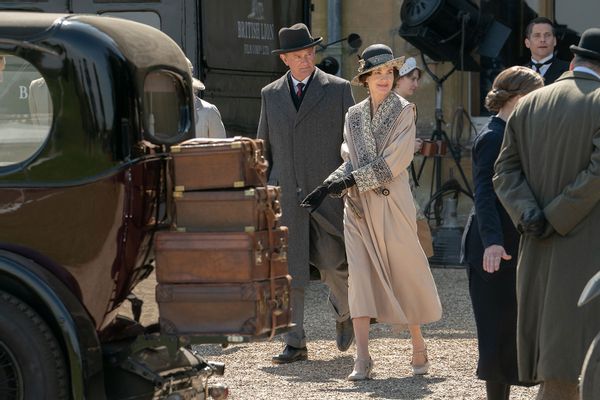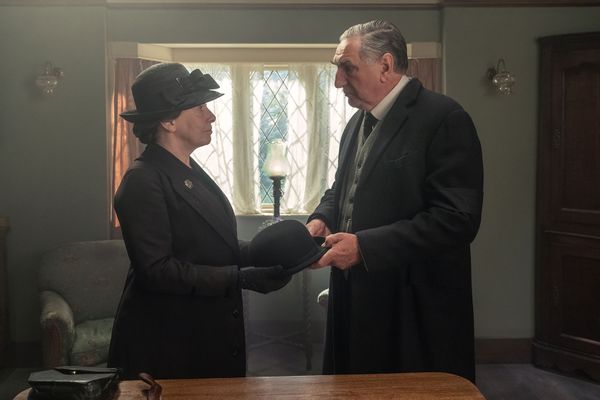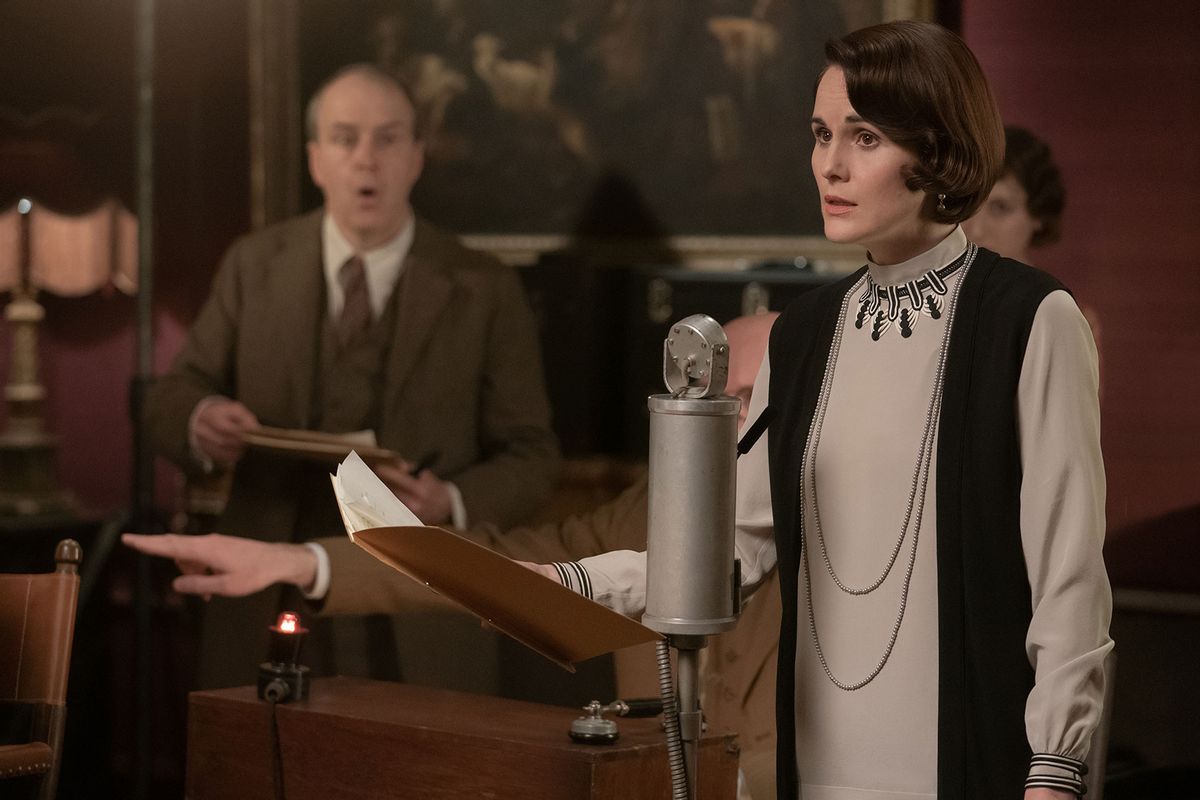"Release your job," chants Big Freedia on Beyoncé's new single, "Break My Soul." It's a risky proposition heading into what economists predict will be a new recession, but with wages stagnant and inflation ballooning, it's clear the status quo is not sustainable.
A century ago, as the stock market crash of 1929 approached, it was clear major societal change was afoot. Fascism was on the rise as people's economic security grew ever more precarious — hm, relatable — and even in the escapist soap opera of "Downton Abbey," the moneyed Crawley family could feel it coming.
In "A New Era," the TV hit's second feature film (streaming now on Peacock and out on Blu-ray and DVD on July 5), head of household Lady Mary (Michelle Dockery) — already trailblazing, being a woman and all — invites a film crew to shoot a silent movie at Downton in 1928. Though at one time it would have been unheard of to stoop below her blue-blooded heritage and fraternize with showbiz professionals, Lady Mary knows that Downton is an expensive estate to run. The additional income will help keep the storied manor in top condition as the Crawleys' peers are forced to sell off their own property to stay afloat.
 Hugh Bonneville and Elizabeth McGovern star as Robert and Cora Grantham, Robert James Collier as Thomas Barrow, Phyllis Logan as Mrs. Hughes and Jim Carter as Mr. Carson in Downton Abbey: A New Era (Ben Blackall / © 2022 Focus Features)
Hugh Bonneville and Elizabeth McGovern star as Robert and Cora Grantham, Robert James Collier as Thomas Barrow, Phyllis Logan as Mrs. Hughes and Jim Carter as Mr. Carson in Downton Abbey: A New Era (Ben Blackall / © 2022 Focus Features)
"The state of progress is agonizingly slow." – Jim Carter
That willingness to adopt new ways – the upper classes used to only patronize the arts, not benefit from what was seen as common trade or labor – is what ensures the Crawleys are set up to survive the forthcoming economic downturn (though they don't know exactly what's headed their way). In 2022, similar economic and political conditions mean that the status quo — a minimum wage that hasn't budged in more than a decade; a Supreme Court striking down decades of precedent in one session — just isn't going to cut it anymore, either. Beyoncé is "looking for a new foundation," and so are the people today.
RELATED: Hugh Bonneville on the enduring charm of "Downton Abbey"
The "Downton Abbey" cast and crew spoke to Salon about what it takes for progress to happen and insights from the franchise itself.
"It's cyclical," explains star Raquel Cassidy, who plays a lady's maid in the franchise. "Maybe that's one of the reasons why 'Downton' is so popular — or any of these period dramas — because we can see it all happening, but it's that far away and therefore, although we're moved by it or appalled by it or whatever, it's still at a distance. So it's not quite so raw."
But why does it seem like we're facing the same struggles as 100 years ago? And how do we prevent the same issues from popping up in another century?
"The history of mankind proves that we never learn anything or else we wouldn't be in this state with Ukraine now, would we? The state of progress is agonizingly slow," says Jim Carter, aka the esteemed butler Mr. Carson. "We've got rail strikes today in the same way as we had them in the '70s. I'm not pointing a finger of blame there, but self-interest wins out all the time, I'm afraid."
 Phyllis Logan stars as Mrs. Hughes and Jim Carter as Mr. Carson in Downton Abbey: A New Era (Ben Blackall / © 2022 Focus Features)In reality, progress is slow, but it's still progress. And we're going to keep facing the same issues "until we smash capitalism," jokes Carter.
Phyllis Logan stars as Mrs. Hughes and Jim Carter as Mr. Carson in Downton Abbey: A New Era (Ben Blackall / © 2022 Focus Features)In reality, progress is slow, but it's still progress. And we're going to keep facing the same issues "until we smash capitalism," jokes Carter.
Beyoncé's "Break My Soul" encapsulates the feelings of the Great Resignation, yes, but the song (and the sentiment) is not just about quitting.
The only option: to embrace change, just as the Crawleys are doing in "A New Era." Even the fictional filmmakers who take over Downton are forced to pivot to a talkie mid-production. It's a move "A New Era" director Simon Curtis likens to a shift the industry is currently feeling: "There's a parallel with the film industry undergoing a great technological change with what's going on now with cinemas versus streaming, so I think you have to embrace the new technology and make it work for you."
But the Crawleys weren't always so willing to embrace a new way of life. It took years for the family to adjust when youngest daughter Sybil (Jessica Brown Findlay) fell in love with and eventually married chauffeur Tom Branson (Allen Leech). And although the downstairs residents of Downton Abbey have aspired to more, only a few were able to move on to move on from a life in service to a new profession: Tom with his marriage, housemaid Gwen (Rose Leslie) becoming a secretary, and Mr. Molesley (Kevin Doyle) becoming a schoolteacher (and, no spoilers, his new venture in "A New Era"). Without that preparation, would the Crawleys have been open to the declassé movie industry as a way to keep up their home?
What will it take for someone to achieve real progress in today's economic climate? Short of smashing capitalism, leaving behind what isn't working could be a start.
Beyoncé's "Break My Soul" encapsulates the feelings of the Great Resignation, yes, but the song (and the sentiment) is not just about quitting. More importantly, it's about recalibrating one's priorities. And while the Crawleys figured this out peripherally, the circumstances are just right for people today to realize this on their own. If we want to survive our own societal shift, it's best to heed the advice Cassidy's character, Miss Baxter, offers: "Times change; we must change with them."
"Downton Abbey: A New Era" is now streaming on Peacock and out on Blu-ray and DVD on July 5.
More stories to check out:



Shares